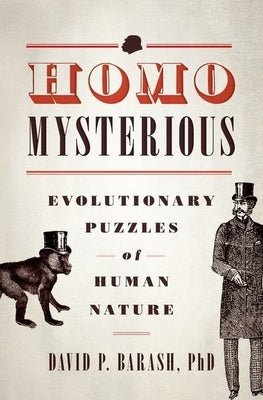1
/
of
1
Oxford University Press, USA
Homo Mysterious: Evolutionary Puzzles of Human Nature
Homo Mysterious: Evolutionary Puzzles of Human Nature
Regular price
$27.95 USD
Regular price
Sale price
$27.95 USD
Shipping calculated at checkout.
Quantity
Couldn't load pickup availability
For all that science knows about the living world, notes David P. Barash, there are even more things that we don't know, genuine evolutionary mysteries that perplex the best minds in biology. Paradoxically, many of these mysteries are very close to home, involving some of the most personal
aspects of being human. Homo Mysterious examines a number of these evolutionary mysteries, exploring things that we don't yet know about ourselves, laying out the best current hypotheses, and pointing toward insights that scientists are just beginning to glimpse. Why do women experience orgasm? Why do men have a shorter
lifespan than women? Why does homosexuality exist? Why does religion exist in virtually every culture? Why do we have a fondness for the arts? Why do we have such large brains? And why does consciousness exist? Readers are plunged into an ocean of unknowns--the blank spots on the human evolutionary
map, the terra incognita of our own species--and are introduced to the major hypotheses that currently occupy scientists who are attempting to unravel each puzzle (including some solutions proposed here for the first time). Throughout the book, readers are invited to share the thrill of science at
its cutting edge, a place where we know what we don't know, and, moreover, where we know enough to come up with some compelling and seductive explanations. Homo Mysterious is a guide to creative thought and future explorations, based on the best, most current thinking by evolutionary scientists. It captures the allure of the not-yet-known for those interested in stretching their scientific imaginations.
Author: David P. Barash
Publisher: Oxford University Press, USA
Published: 10/01/2013
Pages: 352
Binding Type: Paperback
Weight: 0.95lbs
Size: 9.10h x 6.10w x 1.00d
ISBN: 9780199324521
aspects of being human. Homo Mysterious examines a number of these evolutionary mysteries, exploring things that we don't yet know about ourselves, laying out the best current hypotheses, and pointing toward insights that scientists are just beginning to glimpse. Why do women experience orgasm? Why do men have a shorter
lifespan than women? Why does homosexuality exist? Why does religion exist in virtually every culture? Why do we have a fondness for the arts? Why do we have such large brains? And why does consciousness exist? Readers are plunged into an ocean of unknowns--the blank spots on the human evolutionary
map, the terra incognita of our own species--and are introduced to the major hypotheses that currently occupy scientists who are attempting to unravel each puzzle (including some solutions proposed here for the first time). Throughout the book, readers are invited to share the thrill of science at
its cutting edge, a place where we know what we don't know, and, moreover, where we know enough to come up with some compelling and seductive explanations. Homo Mysterious is a guide to creative thought and future explorations, based on the best, most current thinking by evolutionary scientists. It captures the allure of the not-yet-known for those interested in stretching their scientific imaginations.
Author: David P. Barash
Publisher: Oxford University Press, USA
Published: 10/01/2013
Pages: 352
Binding Type: Paperback
Weight: 0.95lbs
Size: 9.10h x 6.10w x 1.00d
ISBN: 9780199324521
About the Author
David P. Barash is Professor of Psychology and Biology at the University of Washington, Seattle, and author or coauthor of dozens of books, including The Hare and the Tortoise: The Conflict between Culture and Biology in Human Affairs; Madame Bovary's Ovaries: A Darwinian Look at Literature; and
Payback: Why We Retaliate, Redirect Aggression, and Take Revenge. He is also a regular contributor to the Chronicle of Higher Education and to the op-ed page of the Los Angeles Times, one of the founders of sociobiology, a Fellow of the AAAS, and the recipient of numerous awards.
This title is not returnable
Share


